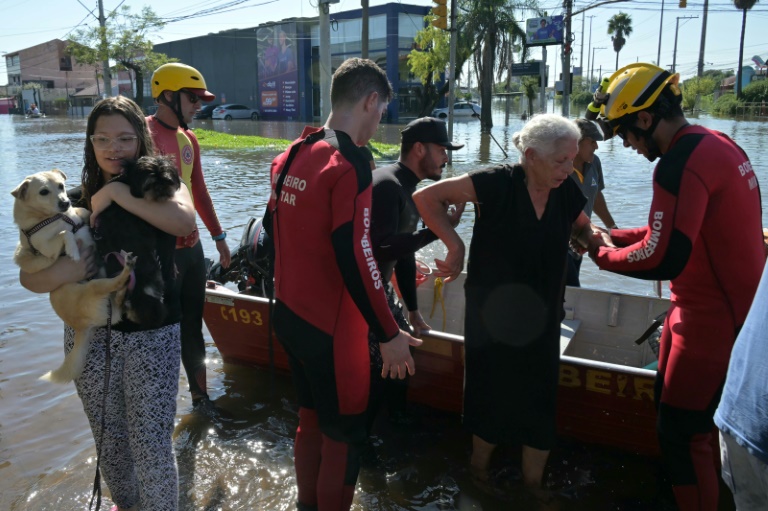In all her 74 years Lorena Martins had never seen anything so horrible: a torrent of foul, rust-colored flood water engulfing her modest home in Brazil, taking away everything but her family.
With help from her son-in-law, Martins steps out of a boat manned by firefighters who managed to persuade them to abandon their home in a poor district of the city of Porto Alegre, which has been devastated by days of flooding.
The latest in a string of weather catastrophes to hit the South American giant has left dozens of people dead or missing and forced nearly 130,000 from their homes in the capital of southern Rio Grande do Sul state.
The boat carrying Martins arrives at a flooded intersection that has become a makeshift pier for rescue operations.
Motorboats, jet skis and row boats come and go constantly as crews try to persuade people who refuse to leave their flooded homes.
A military police officer from neighboring Santa Catarina state, Dionis Bellettini, has shown up as a volunteer, eager to help in this improvised rescue armada.
Some people are refusing to leave their homes for fear of seeing them looted, said Bellettini, who wears a life jacket and civilian clothes despite his military status.
“We cannot force them to leave. It is optional,” he tells AFP as three men behind him try to repair a motorboat needed for the many rescue trips that await them. A four-wheel-drive vehicle towing yet another boat pulls up to join the operation.
– ‘It is so sad’ –
These volunteers are urgently needed because the government cannot save all the people standing on their rooftops looking at streets turned into rivers in this booming 250-year-old city of 1.4 million people, which manages at once to be both modern and quaint.
Martins, her son-in-law Elisandro, his wife Carmen and their 14-year-old daughter Giovanna stand on the street corner fiddling with bags of food, like uncooked pasta. They look out sadly at all the water everywhere and comfort their two dogs.
The moment is almost peaceful compared to Saturday, when they saw the reddish flood waters rise steadily in their home and they decided to stay put anyway.
“Today I saw death,” said Martins, acknowledging that the flood water scared her.
“My little house is abandoned now. I am trying to stay calm,” she says, as her voice quivers and she can no longer speak. Martins looks positively exhausted.
“It is so sad,” she manages to say. “I think about the poorest people.”
The toll in the flood so far is 83 dead and 111 missing.
– ‘Scenes of terror’ –
The number of people forced from their homes is also rising as rescue efforts press on during a break in the torrential rains.
A stunning amount of water has pushed the Guaiba river and its tributaries to the highest level ever recorded.
“We have seen scenes of terror,” said Filipe Bezbatti, a 27-year-old event organizer in a wet suit as he tries to fix the boat he uses to make one rescue run after another.
“It should be the government that is leading,” Bezbatti complains.
“This is people helping people,” adds Jefferson Martines, a 28-year-old entrepreneur who is also helping with the rescues.
The two men met on the street corner that has become a makeshift operations center and are now on the same team.
Not far away a nurse named Paola Martinez holds out food to try to lure three dogs across a waterlogged street. Bezbatti eventually helps her get them into a boat and onto dry land.
President Luiz Inacio Lula da Silva has said the state will get all the resources it needs in order to rebuild. And Governor Eduardo Leite has said it will need nothing short of a Marshall Plan, like the one that rebuilt Europe after World War II.
But for now people have more immediate needs: things like food, clothing and medicine.
It is midday and the sun is beating down as neighbors rescue neighbors all over the flooded and shellshocked city.
mr/app/nn/dw/bfm
